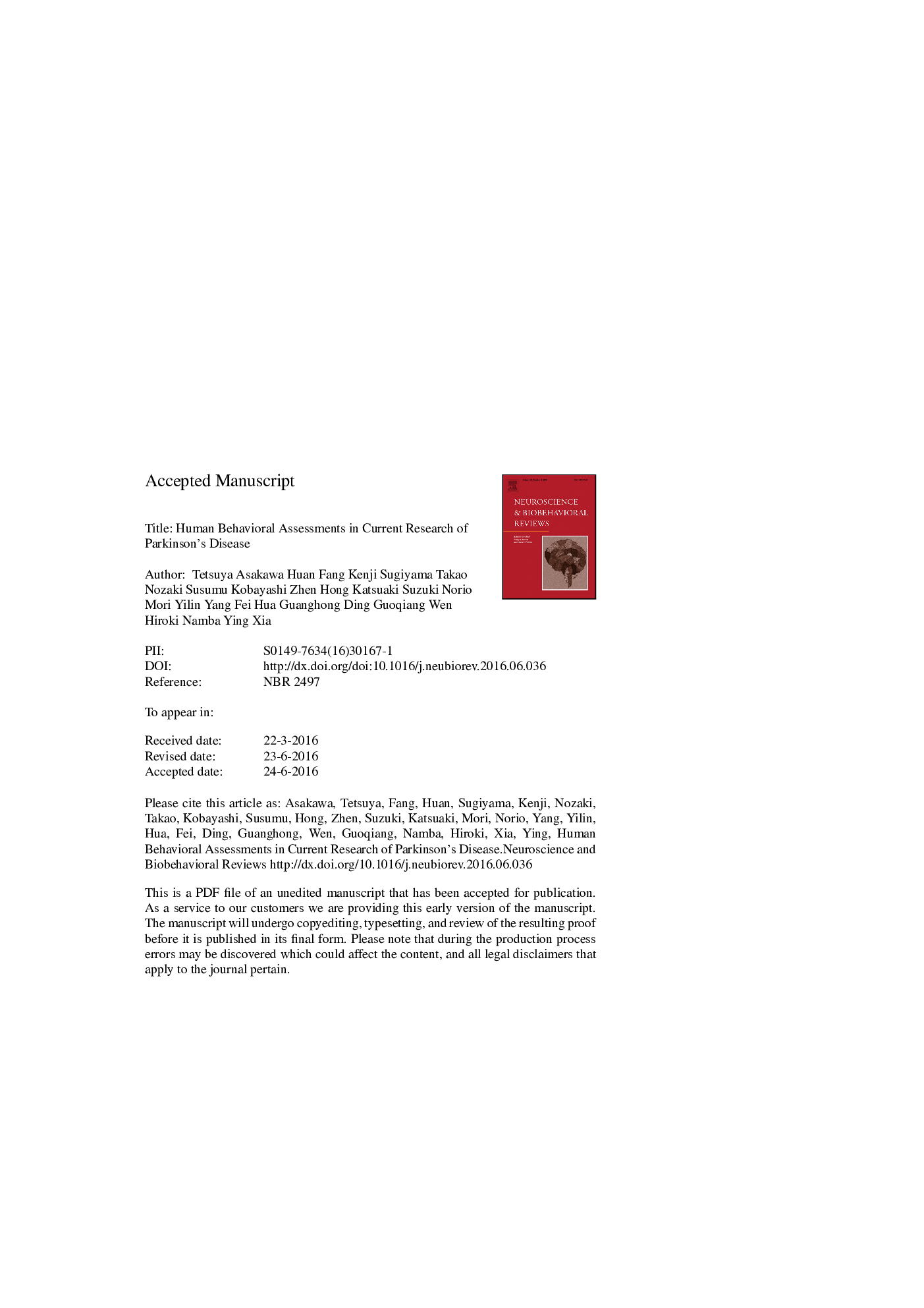| Article ID | Journal | Published Year | Pages | File Type |
|---|---|---|---|---|
| 7303038 | Neuroscience & Biobehavioral Reviews | 2016 | 110 Pages |
Abstract
Parkinson's disease (PD) is traditionally classified as a movement disorder because patients mainly complain about motor symptoms. Recently, non-motor symptoms of PD have been recognized by clinicians and scientists as early signs of PD, and they are detrimental factors in the quality of life in advanced PD patients. It is crucial to comprehensively understand the essence of behavioral assessments, from the simplest measurement of certain symptoms to complex neuropsychological tasks. We have recently reviewed behavioral assessments in PD research with animal models (Asakawa et al., 2016). As a companion volume, this article will systematically review the behavioral assessments of motor and non-motor PD symptoms of human patients in current research. The major aims of this article are: (1) promoting a comparative understanding of various behavioral assessments in terms of the principle and measuring indexes; (2) addressing the major strengths and weaknesses of these behavioral assessments for a better selection of tasks/tests in order to avoid biased conclusions due to inappropriate assessments; and (3) presenting new concepts regarding the development of wearable devices and mobile internet in future assessments. In conclusion we emphasize the importance of improving the assessments for non-motor symptoms because of their complex and unique mechanisms in human PD brains.
Keywords
DBS6-OHDAIGTDEXEDSGAIBAIMGTACE6-HydroxydopamineMDSASIFSSASsMMSEMPTPGDSICSSPANSSBDIMFB9HPTNORCES-DCGIMattis dementia rating scaleMADRSICBHDIFTTHMSNPINDDHARSLARSBBTNMSSMCQGHQCOPMEdinburgh Depression ScaleMini-Balance Evaluation Systems TestFTSTSJTTMASCSDysexecutive Questionnaire1-methyl 4-phenyl 1,2,3,6-tetrahydropyridine6MWTADLsNARTOMSNational Adult Reading TestSix-minute walking test9-hole peg testNeurodegenerative disorderEMGelectromyographyFreezing of Gait QuestionnaireCanadian Occupational Performance MeasureAIMSCETFrontal assessment batteryBtALewy bodymedian forebrain bundleBESTestParkinson’s diseasedeep brain stimulationControlled Oral Word Association TestBalance Evaluation Systems TestFinger Tapping Testleucine-rich repeat kinase 2IMUIUSDopamineGPSGlobal position systemNovel object recognitionFabactivities of daily lifeMini Mental State ExaminationHospital Anxiety and Depression ScaleGeriatric Depression ScaleHamilton Depression ScaleHamilton anxiety rating scaleMontgomery-asberg depression rating scaleFatigue severity scaleNon-motor symptoms scaleAbnormal Involuntary Movement Scalepositive and negative syndrome scaleFogAutonomic symptomsPASHADSHAMDIowa Gambling TaskDelayed responseBeck Anxiety InventoryBeck Depression InventoryGeneral Health QuestionnaireNeuropsychiatric InventoryComputer-visionCOWATFreezing of gait
Related Topics
Life Sciences
Neuroscience
Behavioral Neuroscience
Authors
Tetsuya Asakawa, Huan Fang, Kenji Sugiyama, Takao Nozaki, Susumu Kobayashi, Zhen Hong, Katsuaki Suzuki, Norio Mori, Yilin Yang, Fei Hua, Guanghong Ding, Guoqiang Wen, Hiroki Namba, Ying Xia,
